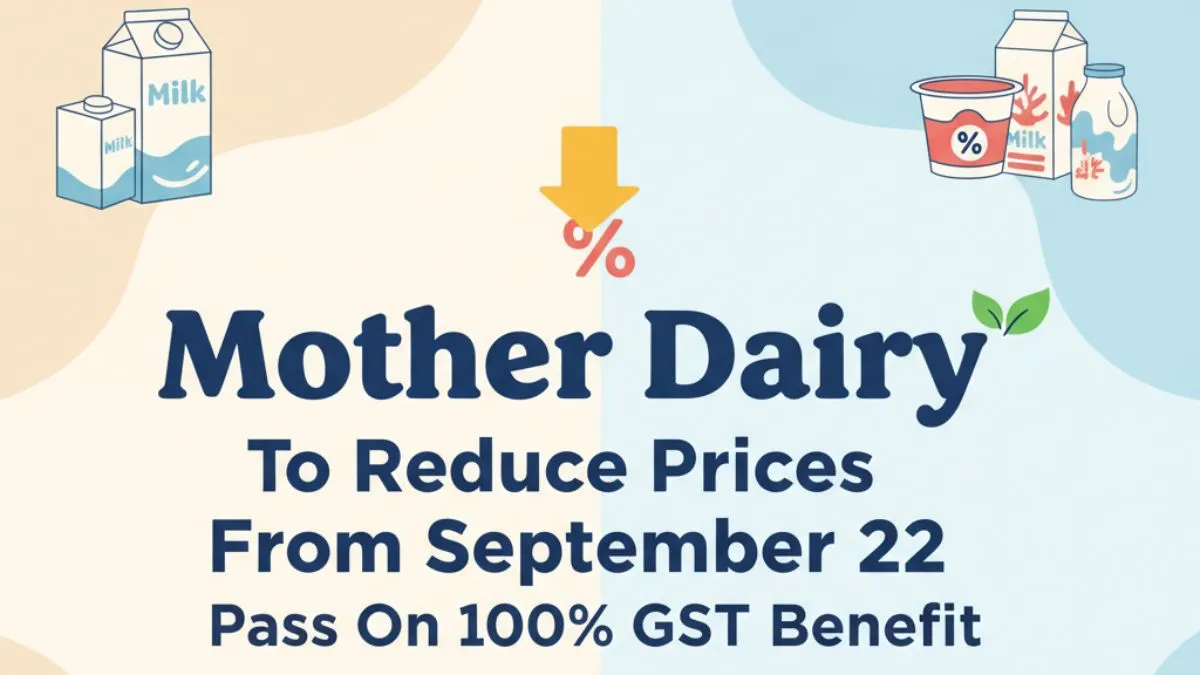Now Reading: Mother Dairy Cuts Prices After GST Reform
-
01
Mother Dairy Cuts Prices After GST Reform
Mother Dairy Cuts Prices After GST Reform

In a significant move aimed at benefiting consumers, Mother Dairy has announced a sweeping reduction in prices across a wide range of its dairy and processed food products. The price cuts, effective from September 22, 2025, are a direct result of the recent GST reforms enacted by the Indian government, which have rationalized tax rates on various food items.
The company, a wholly-owned subsidiary of the National Dairy Development Board (NDDB), stated that the price reductions are a full pass-on of the tax benefits to its customers, aligning with the spirit of the GST reforms. With the revised GST norms, Mother Dairy’s entire product portfolio now falls under either the exempted/nil category or the lowest 5% GST slab.
Price Reductions Across Key Categories
The price changes vary by product, with reductions ranging from ₹1 to as much as ₹30. This makes a host of daily essentials and popular indulgences more affordable for millions of households.
- Milk and Dairy Products: While the price of everyday pouch milk variants like Full Cream and Toned Milk remains unchanged as they were already exempt from GST, a significant price cut is seen in Ultra-High Temperature (UHT) milk, which will now attract a 0% GST, down from 5%. This brings the price of a one-litre UHT toned milk tetra pack down from ₹77 to ₹75. Similarly, paneer has also been moved to the nil GST category, with a 200 gm pack now costing ₹92 instead of ₹95.The new GST structure has also lowered the tax on several other value-added dairy items from 12% to a uniform 5%. This has led to noticeable price drops for:
- Butter: A 500 gm pack of butter will now cost ₹285, a considerable reduction from its previous price of ₹305.
- Cheese: Cheese cubes (180 gm) have been reduced from ₹145 to ₹135, and cheese slices (200 gm) from ₹170 to ₹160.
- Ghee: Prices for ghee have also been slashed, with a one-litre ghee tin seeing a reduction from ₹750 to ₹720.
Ice Creams and Safal Products Get Cheaper
A major change is the reduction of GST on ice creams, which has been lowered drastically from 18% to just 5%. This reform is expected to significantly boost the consumption of branded ice creams, especially in a price-sensitive market like India. As a result, popular ice cream products like the Shahi Meva Malai Tub (1 litre) will now be available for ₹300, down from ₹330.
Mother Dairy’s processed food brand, Safal, has also passed on the GST benefits to its customers. The tax on all its value-added horticulture products, including frozen snacks, jams, and pickles, has been uniformly reduced from 12% to 5%. This has made items like Frozen French Fries (1000 gm) more affordable, with their price dropping from ₹230 to ₹215.
Impact and Industry Outlook
According to Mother Dairy’s Managing Director, Manish Bandlish, this is a “progressive step” that will not only make quality products more accessible but also stimulate demand across the entire value chain. The company is confident that the lower prices will encourage more consumers to shift from the unregulated market to high-quality, safely packaged offerings.
The GST reform is being widely hailed as a win-win for both consumers and the dairy industry. Consumers benefit from lower monthly grocery bills, while farmers are set to benefit from increased demand for milk and raw materials. Industry experts believe that by making branded products more competitive, this move will help formalize the dairy sector, reduce adulteration, and encourage investment in the supply chain. The timing, just ahead of the festive season, is also expected to further boost sales and positively impact the entire ecosystem.








